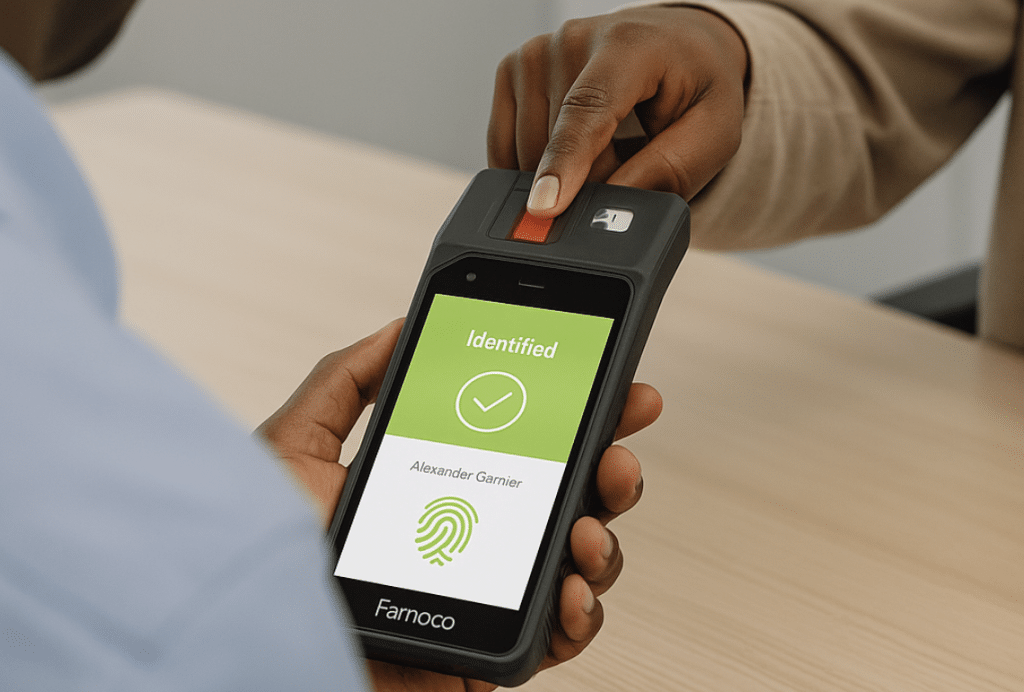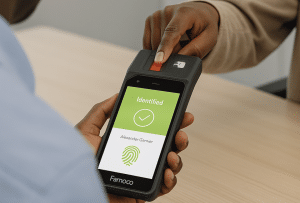In Africa, millions of people live without any form of legal identity—an issue that remains one of the major obstacles to the continent’s development. According to the World Bank’s 2021 survey, nearly 500 million Africans do not possess official documents proving their legal existence. This administrative invisibility has profound consequences, severely limiting access to essential services and basic rights.
Today, digital identity goes far beyond administrative formalities: it has become a gateway to education, healthcare, social protection, and financial services. Without it, large segments of the population remain excluded from socio-economic development and digital inclusion.
The impact of lacking legal identity in Africa
A major obstacle for individuals: social, economic, and civic exclusion
The lack of legal identity deprives millions of Africans of fundamental rights. Without a birth certificate, many children cannot be enrolled in school, excluding them from the education system from the outset. Access to healthcare, vaccinations, and maternal services is also restricted, as proof of identity is often required. This exclusion extends to social and humanitarian assistance, which typically depends on formal identification.
Civically, the absence of official documents prevents individuals from voting and accessing justice, making it impossible to claim or defend their rights. This situation creates a vicious cycle of generational exclusion: parents without identity documents are often unable to register their children, perpetuating marginalization.
At the same time, financial inclusion becomes inaccessible: without legal ID, it is nearly impossible to open a bank account, apply for credit, or secure formal employment. As Dr. Joseph Atick, president of ID4Africa, explains: “The sector that benefits most from digital identity is financial inclusion. Enabling someone to access a bank account changes everything.”
A barrier to the economic development of African nations
The lack of legal identity doesn’t just affect individuals—it also hinders economic development at the national level. Without a reliable registration system, governments face major challenges in public policy planning, efficient resource allocation, and targeting social programs. Tax collection is also compromised, limiting funding for public services.
According to the United Nations Economic Commission for Africa, the implementation of digital identity systems could increase African countries’ GDP by 1 to 3%, notably by improving financial inclusion and lowering transaction costs. Proper identification also enables more accurate budget planning and more effective governance, highlighting identity’s strategic role in shaping the continent’s future.
The World Bank considers civil registration—known as CRVS (Civil Registration and Vital Statistics)—to be the foundation of both legal identity and national development planning.
Challenges in accessing identity in Africa
Geographic and infrastructure barriers
Africa’s vast geography and dispersed rural populations make it difficult to access civil registration services. In many countries, civil registration offices are concentrated in urban areas, making it particularly hard for rural communities to register births.
The lack of basic infrastructure—such as reliable roads or electricity—compounds the issue. These geographic constraints call for innovative solutions capable of operating in challenging environments and reaching even the most remote populations.
Digital divide and connectivity issues
The digital divide remains a major concern across Africa. According to ID4Africa experts, while mobile phones are widespread, only one in three Africans has a device capable of connecting to the internet. This technological limitation significantly hinders the rollout of modern digital identity systems.
In many areas with limited or no connectivity, identity solutions must be designed to function offline while maintaining data security and integrity.
Sovereignty and data protection
The collection and storage of identity data—especially biometric data—raises major ethical and legal concerns. Data sovereignty has become a key issue for African governments, who want to maintain control over their citizens’ sensitive information.
As Jules Hervé Yimeumi, founder of the Africa Data Protection association, states: “The mass digitization of people must strike a balance between identifying individuals and preserving their ability to act freely and autonomously.” Yet only 24 of Africa’s 54 countries currently have a dedicated data protection authority—highlighting the urgent need to strengthen regulatory frameworks.
Innovative solutions for identity in Africa
The biometric revolution
Biometric technologies have transformed identity systems across Africa by providing a reliable and accurate way to verify individuals—even in contexts where physical documents can easily be lost or falsified.
The biometric market in Africa and the Middle East is expanding rapidly, with an annual growth rate of 21%, according to the 2020 report Biometrics – Global Market Trajectory & Analytics. This growth reflects the increasing adoption of biometrics by governments and organizations seeking to secure identity verification and combat identity fraud.
Solutions adapted to African realities
To meet Africa’s specific identity challenges, rugged and secure mobile devices are being deployed in the field. These terminals are designed to operate in extreme conditions and without continuous connectivity, making it possible to register individuals even in the most remote regions. Their ability to function offline ensures the continuity of services, even in areas without network coverage.
Combined with hybrid approaches—blending physical and digital identity—these solutions support a gradual and locally adapted transition to digital ID systems, taking into account varying levels of technological familiarity.
Open platforms and interoperability
Open platforms such as MOSIP (Modular Open Source Identity Platform) represent a major step forward in identity systems across Africa. These platforms allow countries to develop tailor-made solutions that meet their specific needs, while relying on a proven and scalable technological foundation.
System interoperability is also crucial for maximizing impact. Common standards allow identity systems to integrate with other sectors such as healthcare, education, or financial services—enabling digital identity to serve a broad range of public and private needs.
Open standards and Digital Public Goods
In line with the goals of interoperability and digital sovereignty, many African countries are now adopting Digital Public Goods (DPGs)—open, reusable, and auditable digital tools. MOSIP is a leading example of this approach.
Additionally, interoperability frameworks such as OSIA, supported by ID4Africa, enable identity systems to communicate with various government services. The adoption of these standards helps build inclusive, secure, and efficient Digital Public Infrastructure (DPI), in line with World Bank recommendations.
Success stories and case studies
Exemplary government programs
Several African countries have made significant progress in deploying inclusive and efficient identity systems.
In Mauritania, the national biometric registry led by ANRPTS (National Agency for the Registry of the Population and Secure Documents) already covers over 80% of the population, with the goal of expanding access to public services and improving the effectiveness of social programs.
Rwanda has implemented a biometric identity system that covers over 98% of its population, facilitating access to both public and private services.
In Côte d’Ivoire, major initiatives include the creation of the Office National de l’État Civil et de l’Identification (ONECI) and the rollout of secure biometric ID cards with a unique national identification number.
Public-private collaboration
Some of the most successful identity initiatives result from strategic partnerships between governments, private sector actors, and international organizations. These collaborations help pool resources, share expertise, and deploy technology at scale.
The World Bank’s ID4D program plays a central role in supporting African identity initiatives through funding and knowledge sharing.
One key example is the WURI program (West Africa Unique Identification for Regional Integration and Inclusion), which aims to develop inclusive, portable, and secure identity systems across several West African countries—regardless of nationality. In Côte d’Ivoire, the CNAM (National Health Insurance Fund) is supported by the World Bank under this initiative to ensure equitable access to healthcare coverage.
Impact on social and economic inclusion
Progress in digital identity across Africa has produced tangible benefits in terms of social and economic inclusion. In Ghana, the national ID system is integrated with health services, improving patient tracking and public health program management.
In Tanzania, the communications regulator has mandated biometric SIM card registration, enhancing telecom security and combating fraud. Though restrictive at first, this measure ultimately strengthens consumer protection.
In the financial sector, digital identity makes it easier to open bank accounts and access formal financial services. In humanitarian contexts, organizations use secure identity systems to distribute aid to vulnerable populations—even in low-connectivity areas.
The future of identity in Africa
Africa’s future in identity is promising. Technological innovations continue to break down access barriers, and the convergence of identity systems with mobile financial services and digital health opens up new opportunities for inclusion and digital transformation.
For these advancements to be truly impactful, a human-centered approach is essential—one that respects fundamental rights and adapts to local contexts. Identity should not be an end in itself, but a tool to improve the daily lives of African citizens.
Challenges remain, but growing engagement from African governments and the international community points toward a future where every African can benefit from secure, legal identity—unlocking full participation in social, economic, and political life.
FAQ
Why is legal identity so important for development in Africa?
Legal identity is the foundation for accessing essential services like education, healthcare, social protection, and financial services. For governments, reliable identity systems improve public policy planning, tax collection, and anti-fraud efforts.
How can biometric technology improve identity access?
Biometrics offer a reliable and unique way to verify individuals, even where physical documents may be lost or falsified. Technologies like fingerprint and iris recognition create a secure, immutable link between a person and their digital identity—reducing fraud and enhancing trust.
What are the risks of collecting personal data, and how can they be minimized?
Biometric data collection raises privacy and security concerns. To mitigate these risks, systems must follow a “Privacy by Design” approach, with strong legal frameworks, informed consent mechanisms, and robust encryption. Data sovereignty is also key, ensuring national control over sensitive citizen information.
How can identity solutions work in areas without connectivity?
Enrollment and verification systems can operate offline, storing data securely on devices until a connection is available for synchronization. For daily authentication, technologies like smartcards allow identity checks without internet access.
Which African countries are leading in digital identity?
Rwanda, Nigeria, Morocco, Algeria, Ghana, Tanzania, and Côte d’Ivoire are among the most advanced. Each country has followed a different strategy—some focusing on specific sectors like health or telecom, others opting for broader systems. Their experiences offer valuable insights for other nations.



